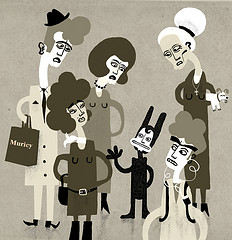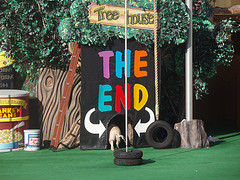[Note: In this article I am going to be addressing the role of the critical voice. I am going to speak as if the critical voice has a personality and motives. I am not saying the critical voice is a distinct personality or that it is separate from us in any way. But by speaking of it as if it is distinct it will give us the ability to deal effectively with only one part of our personality, helping us to get some perspective on what is going on and enabling faster transformation.]
One of the reasons that I love EFT/tapping is because it is very effective in dealing with our critical voice. The critical voice is nothing more than that little nagging voice that is always pointing out everything we have done wrong, everything we are going to do wrong, and everything we are never going to be.
Sometimes this voice is nothing more than a simple annoyance, while at other times it can be so crippling that it prevents us from getting out of bed in the morning.
Because of this most of us don’t have a very good relationship with our critical voice. Many of us resent it and even hate it. One of the underlying themes of my work is to transform the relationship we have with ourselves and with parts of our personality in order to facilitate lasting change. Working with our critical voice is a perfect example of a place where we can apply this principle.
It is very difficult for us to transform our critical voice when we are angry at it. When we are angry at a part of our personality it will entrench itself and fight back. If we are willing to change our attitude toward this part of our personality then we can get it to work with us to create lasting and deep transformation.
Before we can begin the process we need to understand why the critical voice exists.
And the reason might surprise you.
The Critical Voice Exists To Make Our Life Better
I know that statement is very hard to believe. I would even be willing to bet that when you read that statement there was a strong emotional reaction against it, but it’s true.
All parts of our personality exist because they are trying to bring us to our higher good. Just because a part’s motivation is for higher good does NOT mean that it is leading us to our higher good. In this example the critical voice is not pointing things out to make us feel bad or to punish us, but instead is doing so to help us see the errors of our ways so that we will make better choices in the future.
And yes, I know, it doesn’t feel that way. It feels like it is just judging and criticizing.
But, when we are able to recognize that it is trying to help us, it will make it easier for us to transform it into something that is truly helpful. As you will see in this process we do not need to celebrate what the critical voice has done to us to recognize its motivation.
The Process For Transforming Your Critical Voice with Tapping and EFT
One of the nice things about the EFT/tapping protocols is that they are very short and give us the chance to try something out for a few minutes. If it doesn’t work then we can return to what we were doing before. This process is no different. You should be able to complete this process in under 10 minutes.
If you don't buy my “The critical voice is here to help you, but is just doing it in the wrong way”, I would encourage you to give this process a try. If it doesn't work out for you then go back to being mad at the critical voice. The only thing you will have lost is a few minutes tapping on something new.
1) Tune in and connect with the critical voice.
In this step all we need to do is connect with the critical voice. Just close your eyes, take a deep breath, and listen for the voice. It will not be hard to find. Pay attention to where the voice is coming from.
- Is it something that is internal or external?
- Is it the voice of someone you know, does it sound like your speaking voice, or is it some other voice?
- If you were to imagine that the voice belonged to a body, what would that body look like?
The specific answers to these questions aren't important, but by asking them it will be easier for us to connect with the critical part of ourselves, allowing us to do healing work.
2) Affirm the critical voice.
This is going to be the most difficult step of the process because of the hurt and harm we associate with the critical voice. It is important to note that when doing this step we are NOT affirming the tactics of the critical voice and we are NOT affirming the way we feel after we encounter our critical voice. What we are affirming is that it is a part of us that is willing to work very hard to move us to a better life. To do this we would tap on something like:
I would like to give thanks for my critical voice…I am NOT thankful for the tactic that it is using…I am NOT thankful for the way I feel after I experience the critical voice…I am thankful for the fact that there is a part of me that is willing to work so hard…I know that even though it is not doing this…it is trying to make my life better…my critical voice thinks it is making my life better…it thinks that if it berates me…or if it points out everything that is going wrong…that it is going make me make better choices in the future…the critical voice is a very powerful part of me…even if it is not working in a productive way…I know it is working for my betterment…I am thankful that there is a part of me that is willing to work day and night…thinking it is doing what is best for me.
After doing a round of tapping like this we will take some of the edge off. We might not be super-happy with the critical voice, but there is less animosity towards it. At this point that is all we are trying to achieve. When we move from a state of animosity then we are no longer fighting a part of ourselves, and we can now start to work with it.
3) Explain to the critical voice what it is really doing.
As stated above the critical voice in most cases believes that if it is constantly pointing out every flaw and fault, it will motivate us to make better choices. Its motives are either “You don't know you are doing something wrong?” and/or “You don't realize the consequences of these choices?”
In almost every case we are fully aware of the information that the critical voice is providing. In many cases the critical voice is actually over-stating and/or over-reacting to the situation around us. Because we have taken the last step and created a bit of a truce with the critical voice, we can now speak to it with new information.
In this step we are simply going let the critical voice know the consequences of its actions. Try tapping like this:
I know the critical voice is trying to be helpful…but it isn’t…the critical voice is pointing out things I already know…and many times is it pointing out things in a way that is much worse that it really is…the critical voice thinks it is going to encourage me by pointing out my failings…instead I find having every flaw and failing being pointed out to be disheartening…debilitating…I find it very hurtful…I find that it makes it very difficult to believe in myself…it is not pushing me to be better…but instead it is sucking my ability to try right out of my system…I know the critical voice believes it is being helpful…it is not…it is not creating a feeling of encouragement for better…it is creating a feeling of shame…shame is not an emotion of achievement and growth…shame is a feeling of not wanting to try.
4) Show the critical voice proof of its past tactics.
At this point it is very helpful to show the critical voice the proof of what we have just been tapping on. Again, just tune into the critical voice, begin to tap from point to point, and show the critical voice proof of all the ways it has been hurtful and debilitating.
5) Transforming the critical voice into something helpful.
When doing the process with clients there is something very interesting that happens. Clients describe the fact that they can feel the critical voice feeling bad that it has not done its job. I have even had clients describe their critical voice as feeling bad because it feels it is about to be eliminated from the system.
Because we are not fighting with the critical voice (like we were in the beginning), but instead have a relationship with it, we can now guide it to a resource that his helpful. The tapping for this transformation might look like this:
I know the critical voice is very powerful…I have felt the force of its power…but instead of pointing out all of the things I have done wrong…there is a way this voice can be more helpful…I want to harness the power of the voice to be used for my higher good…because I know this voice wants my higher good…I want this voice to stop being a critical voice and become an encouraging voice…because I respond so much better to encouragement…I want this encouraging voice to pick me up when I am down …I want this encouraging voice to push me on to take those last few hard steps…I want the encouraging voice to help me to get started when I can’t quite focus on the task at hand…I want the encouraging voice to use the power it had to see my faults in the past to start to look forward to the opportunities in my future…I want this encouraging voice to move me forward…not keep me stuck in the past…when it does this I will move forward and heal.
This is a very empowering step.
6) Giving the encouraging voice the resources and tools to do its new job.
Just because we want the voice to change (and just because the critical voice wants to become the encouraging voice) doesn't mean the change is going to happen. I have had many clients describe the feeling of having the critical voice being on board with the change but not know what to do next.
I have found the easiest way to complete the change is to ask the critical/encouraging voice what it needs for transformation. The process for this is simple. First, start tapping from point to point. Second, tune back into the critical/encouraging voice. Third, ask it one of the following questions. Fourth, if it states a need based on the questions simply imagine that need being fulfilled.
For example, if it needs permission to change, give it permission. If it needs to know how to encourage you, show it.
Here is a list of sample questions you can ask the voice to help it transform from critical to encouraging.
- Do you need permission to transform?
- Do you need training to transform? If so what type?
- Do you energy to transform? If so what type?
- Do you need to be connected to other parts of the system? What type of connections need to be made?
- What do you need from me to make the transformation?
7) Reassure the encouraging voice.
Even when we choose to make this type of transformation it doesn't always take place all at once. And that is ok. The transformation process can take time. We want the healing to happen in a fashion that is long lasting. We are not looking for a short-term quick fix.
The last part of the process is to reassure the encouraging voice that this is going to take time and that we are willing to help it through the transformation.
Try tapping like this:
I am very happy that my internal voice is willing to become an encouraging voice…I know this process is going to take a little time…which is ok because I want lasting change…not a quick fix…I want my encouraging voice to know that I don’t expect it to be perfect right way…I know it is going to need to learn its way into this new role…I commit to check in regularly with the encouraging voice…making sure it has everything it needs to complete this transformation…I give the encouraging voice permission to ask for help from me…even when I am not checking in with it…this is a change that is good for me now…and for the future.
8) Check back regularly.
If this is a process that is helpful for you I would encourage you to do it two or three times a month for a few months to help this transformation process along. I think it is obvious how making the small change of changing one aspect of our personality will cascade into many radical changes in our lives.

















